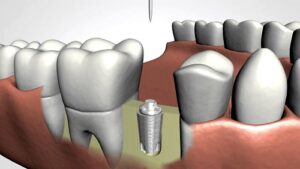 Trinity area residents who have suffered tooth loss and other related dental issues may benefit from dental implants, which offer a permanent solution for replacing lost, damaged or broken teeth.
Trinity area residents who have suffered tooth loss and other related dental issues may benefit from dental implants, which offer a permanent solution for replacing lost, damaged or broken teeth.
Dental implants come in a few different forms, serving a number of different functions, from replacing a single missing tooth that was knocked out accidentally, to replacing an entire mouth’s worth of teeth!
What are Dental Implants?
Trinity dental patients can get a number of different types of dental implants. But all use the same basic principles. The process begins with the removal of the existing damaged tooth, if required. The patient is usually left to heal for a period of several weeks, as bone fills in the empty tooth socket. Some implants can be placed within fairly short order, but it’s common to wait a period of time to give the implant sufficient nearby bone to fuse with in the jaw.
The implant is typically placed into the jaw bone using a local anesthetic. Some patients may be partially sedated using a technique called conscious sedation. The implant base is secured in the bone and in some cases, a bone graft is placed to help promote healing. This is commonly done in cases where the socket has not fully filled in with bone.
Following your dental implant procedure, the healing process for your gums can take a couple weeks, with the implants fully fusing with the jaw bone over the course of several additional weeks.
In the case of all-on-four implants, where an entire jaw’s worth of teeth is secured to four “port”-like implants, the actual teeth are affixed once healing is complete. This may be done for some single-tooth implants as well. In these cases, the visible portion of the tooth is called a crown.
Dental implants can also be used as anchors for bridgework, which is a good option for those who are missing multiple teeth. The dental implant is affixed to several interlinked crowns which “bridge” the gap.
When it comes to dental implants, Trinity dental patients enjoy a permanent solution and once you’ve fully healed, you can use and care for them just as you would natural teeth. All-on-four style implants can allow denture wearers to replace their traditional dentures, as there is no more need for adhesives and the implants are extremely secure.
*Disclaimer: The views expressed here are those of the authors and do not necessarily represent or reflect the views of Anchor Dental Care*

